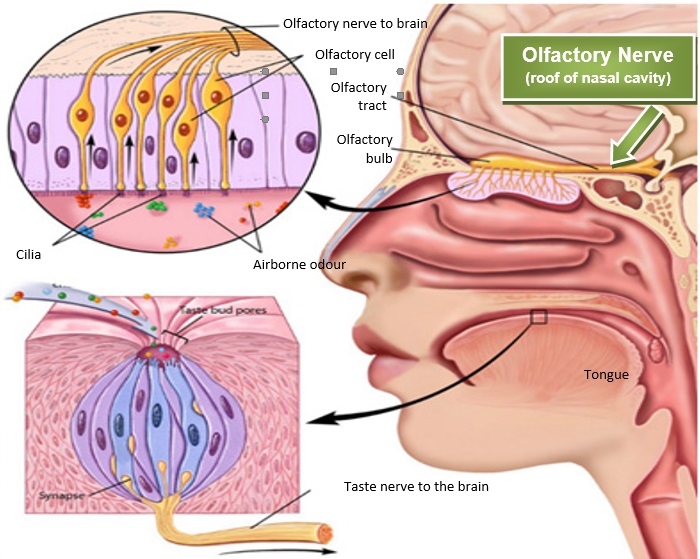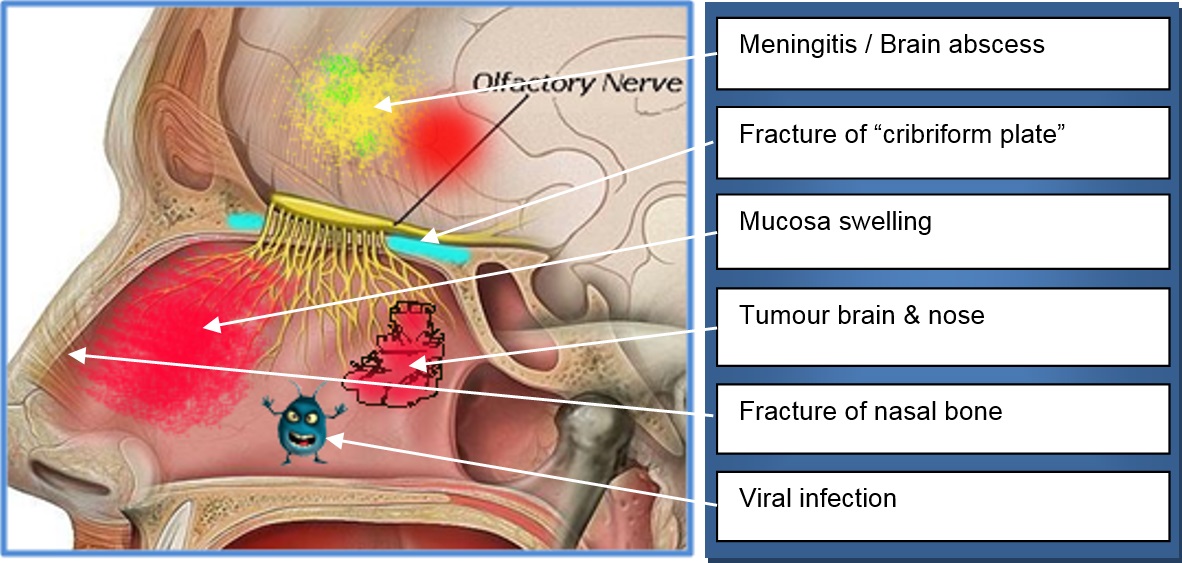Why Can’t I Smell Durian? (Loss of Sense of Smell)
Introduction
The loss of sense of smell occurs when there are problems in the nasal cavity, nasal structure, olfactory nerve (neural system responsible for the sense of smell) or a problem in the brain. Most of us have experienced a loss of sense of smell, especially when we have fever, runny and stuffy nose. In most cases the problem is temporary. Those who suffer from smell disorders experience taste disturbances as well.
The scientists have found that the sense of smell is the most sensitive and accurate at the age of 30 to 60 years. After the age 60, the stimulation of the sense of smell will be less. Women of all ages have more sensitive sense of smell than men.
The nerve of smell (olfactory) is located at the roof of nasal cavity.

Retrieved and edited from: http://www.brainfacts.org/sensing-thinking-behaving/senses-and-perception/ articles/ 2012/ taste-and- smell/
How Do We Smell?
Three elements are necessary for us to smell properly:
- Particles of smell or scent – scent particles released from a substance (e.g. perfume, coffee, and flowers) will go into the nose along with the current of air that we breathe.
- Olfactory nerve – these particles will stimulate the olfactory nerves which are located on both sides of the nose. These nerves are located on the roof of the nasal cavity and covered by a thin mucosa. Once stimulated, the Olfactory nerve will carry electrical signals (impulse) to the brain.
- The Brain – will interpret and translate the electrical signals to a known odour.
(Please refer to the link of animated video provided for better understanding)
http://www.youtube.com/watch?v=dIDBG-UPRUI
There is several definitions loss of sense of smell as in Table 1.
|
Table 1. Definition of loss of sense of smell |
|
|---|---|
|
Anosmia |
Complete loss of smell |
In this article, only anosmia and hyposmia will be discussed
What Are The Causes of Anosmia/ hyposmia?
Among the common causes are head injuries, viral infections and nasal blockage or obstruction.
- Chronic Diseases
- Allergic Rhinitis
- Nasal Polyp (abnormal tissue growth on the mucosa of the nose)
Polyps can cause nasal blockage and prevent aroma or odour particles inhaled reaching the nerve.
- Infections
- Sinusitis
Sinus infections can cause swelling of the mucosa covering the olfactory nerve. This will prevent the odour particles from reaching the sensory nerves at the roof of nasal cavity. Treatment of the infection may restore the sense of smell. - Brain abscess (“brain abscess”)
Brain abscess or infection can cause damage to the smell tissue in the brain. The Loss of sense of smell may be permanent.
- Sinusitis
- Injuries
- Fracture involving the roof of the nasal cavity (“cribriform plate”)
This can lead to the shearing of the olfactory nerves. The anosmia will be permanent. However, if the fracture caused the mucosa to swells (oedema), anosmia or hyposmia will be temporary. - Fracture of nasal bone with bony deformity
This will cause nasal obstruction and prevent odour particles from reaching nerve. - Brain – the resulting anosmia may be permanent or temporary
- Fracture involving the roof of the nasal cavity (“cribriform plate”)
- Tumour
- Nasal Cancer
Sinonasal cancers such as carcinoma or chondrosarcoma can cause neural damage. - Brain Cancer
Meningioma, olfactory neuroblastoma
Anosmia develops in early phase and later followed by visiual difficulty,
Frontal lobe cancer
Anosmia occurs as an early symptom along with forgetfulness and may cause seizures and at a late stage, difficulty to speak
- Nasal Cancer
- Others
- Endocrine/ hormonal dysfunction such as Hypothyroidism (lack of thyroid hormone)
Diabetes - Drugs and toxic chemical exposure such as phenol, chromium, cocaine, insecticides
- Alzheimer’s disease (dementia), Parkinson’s
- Congenital
Kallmann syndrome. (Hypogonadism)
- Endocrine/ hormonal dysfunction such as Hypothyroidism (lack of thyroid hormone)

Retrieved and edited from: http://www.brainfacts.org/sensing-thinking-behaving/senses-and-perception/ articles/ 2012/ taste-and- smell/
Can Anosmia Be Treated?
Treatment depends on the cause which is to be identified:
- Medications
- Decongestant
to reduce the snot, discharge, mucus and swelling in the nasal mucosa. - Steroid Nasal spray
Is indicated for patients suffering from allergic rhinitis, sinusitis or nasal polyp - Oral Steroid Tablet may be helpful
- Decongestant
- Surgery
- “Functional endoscopic sinus surgery” (FESS)
i.e. surgery to remove polyps, mass and any obstruction in the nose. - “Turbinoplasty / turbinectomy”
operation to reduce the size of “inferior turbinate” bone (located in the nasal cavity) to clear any nasal obstruction. - Treatment of tumour or cancer either by surgical removal or by chemotherapy
- “Functional endoscopic sinus surgery” (FESS)
Is It Possible To Prevent The Loss Sense Of Smell?
Early treatment prevents progression of the disorder and its complication/s by:
- Seek medical treatment if you suffer from cold and severe facial pain
- Treat nasal allergy symptoms appropriately, by medical advice such as using nasal spray if necessary.
- Avoid or reduce exposure to things that can worsen allergic symptoms such as; dust, seafood, ice, air conditioners, etc.
- Endoscopic examination of the nose (a small camera is inserted into the nose and the image is viewed on a monitor performed by ENT doctor) helps to view the structures in the nasal cavity and a proper diagnosis is made with appropriate treatment can be taken.
Is Anosmia Harmful?
Anosmia may be harmful in our daily activities, such as the failure to detect burnt smell such as smoke, gas leaks or to detect a stale and rotten food. Therefore, if you suffer from anosmia / hyposmia, then:
- Install fire and smoke alarm/ detectors in your home and work place
- Be careful before eating and inspect the food.
Some patients may suffer from distress, anxiety, depression and significant impairment of the quality of life. Early detection and treatment prevent the disease to become chronic and more debilitating.
Conclusion
Managing anosmia is complicated and requires patience from the patient as well as the doctor. The treatment depends on the cause. Early treatment and advice from the specialist helps prevent treatable cause from being harmful.
References
- Victorial Moore-Gillon, (1997). Abnormalities Of Smell. In Ian S.Mackay, T.R.Bull, Scott Brown’s 6th edition: Rhinology(chapter 5). Great Britain:Butterworth-Heinemann
- Smell and Taste Disorders. Washington, DC:AAO-HNS, 1986.
- Deems DA, Doty RL, Settle RG, Moore-Gillon V, Shaman P, Mester AF, Kimmelman CP, Brightman VJ, Snow JB. Smell and taste disorders: a study of 750 patients from the University of Pennsylvania Smell and Taste Center. Arch Otorhinolaryngol Head Neck Surg 1991;117;519-28
- Doty RL, Bartoshuk L, et al.: Causes of olfactory and gustatory disorders. In: Smell and Taste in Health and Disease. Edited by Getchell TV, Doty RL,et al. New York: Raven; 1991:449–462.
- Temmel AF, Quint C, Schickinger-Fischer B, Klimek L, Stoller E, Hummel T. Characteristics of olfactory disorders in relation to major causes of olfactory loss. Arch Otolaryngol Head Neck Surg 2002;128:635-41.
- Hummel T, Nordin S. Olfactory disorders and their consequences for QoL: a review. Acta Otolaryngolog 2005;125:116-21.
| Last Reviewed | : | 1 December 2015 |
| Writer/Translator | : | Dr. Eshamsol Kamar b. Omar |
| Accreditor | : | Dr. Faridah bt. Hassan |







